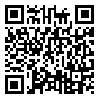Volume 2, Issue 1 And 2 (23 2006)
irje 2006, 2(1 And 2): 27-34 |
Back to browse issues page
Download citation:
BibTeX | RIS | EndNote | Medlars | ProCite | Reference Manager | RefWorks
Send citation to:



BibTeX | RIS | EndNote | Medlars | ProCite | Reference Manager | RefWorks
Send citation to:
Mohammad Shirazi M, Taleban F, Ghafarpoor M. Comparison of Micronutrient Intake in Multiple Sclerosis Patients in Tehran with the Recommended Doses. irje 2006; 2 (1 and 2) :27-34
URL: http://irje.tums.ac.ir/article-1-187-en.html
URL: http://irje.tums.ac.ir/article-1-187-en.html
1- , shirazi@dpimail.net
Abstract: (19966 Views)
Background & Objectives: Multiple Sclerosis (MS) is the most prevalent autoimmune disease of the nervous system in young adults. There are currently more than 30000 cases in Iran and the number is increasing everyday.The objective of this study was to measure the amount of vitamin and mineral intake in MS patients and to compare it with reference values.
Methods: We randomly selected 108 relapsing-remitting MS patients from the Iranian MS society in Tehran in 2005. Two questionnaires- covering personal information and medical data- were filled for each patient. Food intake was assessed by three 24-hour recalls and a quantitative food frequency questionnaire for the year preceding the study. The food intake recorded on the original questionnaire was changed to values in grams using “Manual for Household Measures” and then converted to corresponding amounts of nutrient ingredients by the “Nutritionist 3” program. Data analysis was performed by the SPSS software package. We calculated means and standard deviations for intake levels and applied t tests to compare the results with reference values.
Results: Women with MS took excessive amounts of vitamin A and vitamin C, while their daily intake of folate, vitamin E, vitamin D, magnesium, iron, zinc, iodine and calcium was below reference values. Male patients had higher-than-recommended intake of vitamin A, phosphorous, manganese and iron. Their ingestion of folate, Vitamin D and E, magnesium, zinc, calcium and selenium was shown to be below the recommended amount.
Conclusions: In view of these results, higher intake of vitamin D and calcium is recommended. Women should be encouraged to take more iron and folate as many symptoms of anemia mimics MS symptoms. Considering the well-known role of oxidative stress in the pathogenesis of MS, men should be urged to increase their ingestion of antioxidant-rich foods. It appears that nutritional assessment, dietary counseling and education are necessary for Iranian MS patients.
Methods: We randomly selected 108 relapsing-remitting MS patients from the Iranian MS society in Tehran in 2005. Two questionnaires- covering personal information and medical data- were filled for each patient. Food intake was assessed by three 24-hour recalls and a quantitative food frequency questionnaire for the year preceding the study. The food intake recorded on the original questionnaire was changed to values in grams using “Manual for Household Measures” and then converted to corresponding amounts of nutrient ingredients by the “Nutritionist 3” program. Data analysis was performed by the SPSS software package. We calculated means and standard deviations for intake levels and applied t tests to compare the results with reference values.
Results: Women with MS took excessive amounts of vitamin A and vitamin C, while their daily intake of folate, vitamin E, vitamin D, magnesium, iron, zinc, iodine and calcium was below reference values. Male patients had higher-than-recommended intake of vitamin A, phosphorous, manganese and iron. Their ingestion of folate, Vitamin D and E, magnesium, zinc, calcium and selenium was shown to be below the recommended amount.
Conclusions: In view of these results, higher intake of vitamin D and calcium is recommended. Women should be encouraged to take more iron and folate as many symptoms of anemia mimics MS symptoms. Considering the well-known role of oxidative stress in the pathogenesis of MS, men should be urged to increase their ingestion of antioxidant-rich foods. It appears that nutritional assessment, dietary counseling and education are necessary for Iranian MS patients.
Type of Study: Research |
Subject:
General
Received: 2006/05/16 | Accepted: 2006/07/22 | Published: 2013/09/18
Received: 2006/05/16 | Accepted: 2006/07/22 | Published: 2013/09/18
Send email to the article author
| Rights and permissions | |
 |
This work is licensed under a Creative Commons Attribution-NonCommercial 4.0 International License. |





